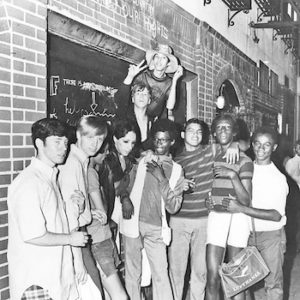
*Black history and the Stonewall Riots are affirmed on this date in 1969. The Stonewall riots, also known as the Stonewall Uprising, Stonewall Rebellion, or simply Stonewall, were a series of protests by members of the LGBTQ community. They responded to a police raid at the Stonewall Inn in Greenwich Village, New York City. Patrons of the Stonewall, other Village lesbian and gay bars, and neighborhood street people fought back when the police became violent. The riots are widely considered the watershed event that transformed the gay liberation movement and the twentieth-century fight for LGBT rights in the United States. What is omitted from the accounts of Stonewall is the contribution of Black and nonwhite allies and members who participated in the protests.
Many wonder why June 28 differed from all the other raids. A joke theory attributes the change to the fact that it was also Judy Garland's funeral. But few have a convincing answer. What is clear is that LGBTQ+ activists at the time were inspired by other movements in the country, especially Black rights protests and sit-ins. Many slogans shouted that night and used throughout the demonstrations, like "Gay Power" and "Pink Panthers," were taken directly from black organizations in the American Civil Rights movement.
As was common for American gay bars then, the Mafia owned the Stonewall Inn. While police raids on gay bars were routine in the 1960s, officers quickly lost control of the situation at the Stonewall Inn that evening. Tensions between New York City Police and gay residents of Greenwich Village erupted into more protests the next evening and again several nights later. Within weeks, Village residents organized activist groups demanding the right to live openly regarding their sexual orientation without fear of arrest. The new activist organizations concentrated on aggressive tactics, and within months, three newspapers were established to promote the rights of gay men and lesbians.
That night at Stonewall, trans people, particularly nonwhite trans women, are credited with starting the first altercations with police. While there are debates about who threw the first "brick," there is no doubt that people like Sylvia Rivera, Marsha P. Johnson, and Stormé DeLarverie were among the first protestors to fight back. (The "P" in Marsha's name stood for "pay it no mind," which is how she responded to questions about her gender.) A year after the uprising, the first gay pride marches were held in Chicago, Los Angeles, New York, and San Francisco to commemorate the anniversary.
Within a few years, gay rights organizations were founded across the U.S. and globally. Today, LGBT Pride events are held annually in June in honor of the Stonewall riots. The Stonewall National Monument was established at the site in 2016. An estimated 5 million participants commemorated the 50th anniversary of the Stonewall uprising. On June 6, 2019, New York City Police Commissioner James P. O'Neill formally apologized for officers' actions at Stonewall in 1969.